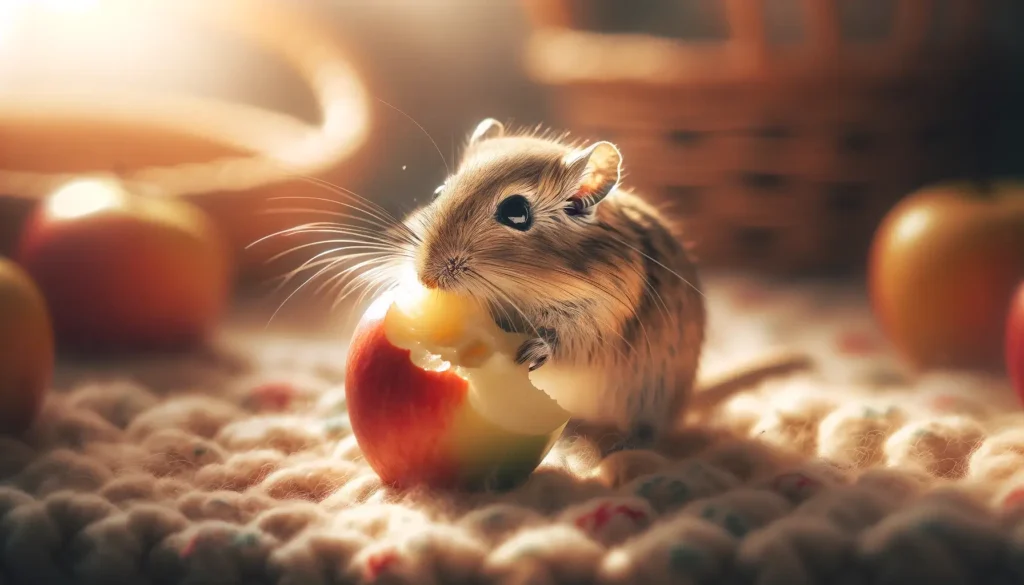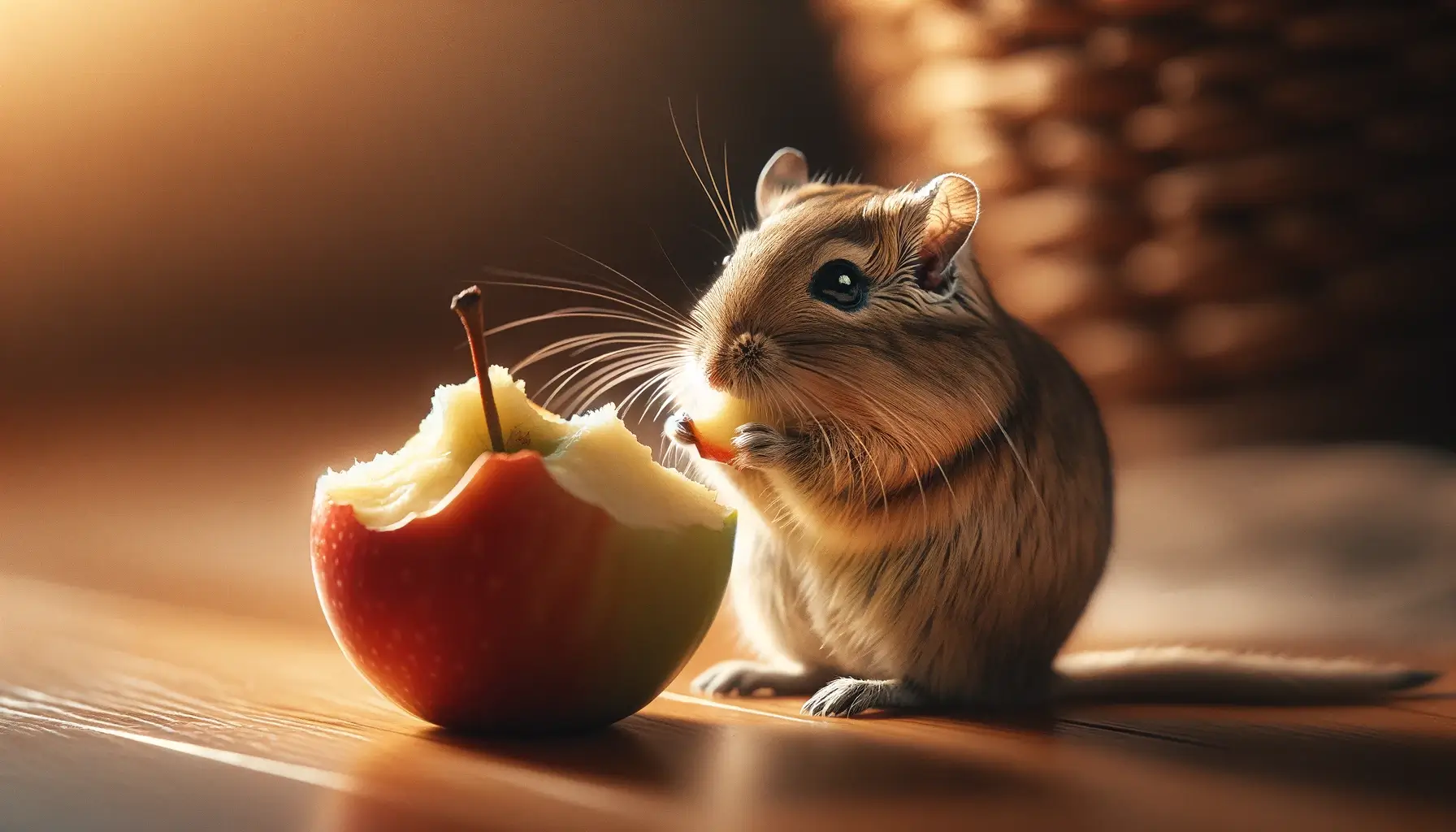Gerbils are fascinating and energetic pets that have captured the hearts of many pet owners around the world. Known for their curious nature and playful personalities, these small rodents make excellent companions, especially for those looking for a pet that requires relatively low maintenance.
However, like all pets, gerbils have specific needs that must be met to ensure they live a happy and healthy life. One of the most crucial aspects of caring for a gerbil is understanding and providing a balanced diet. A proper diet not only supports their physical health but also contributes to their overall well-being.
Understanding Gerbils’ Dietary Needs
Gerbils are omnivores, which means they thrive on a diet that includes both plant-based and animal-based foods. In the wild, their diet consists of seeds, grains, insects, and various fruits and vegetables. This diverse diet helps meet their nutritional needs, providing them with the necessary vitamins, minerals, and other nutrients essential for their health.
The foundation of a gerbil’s diet in captivity should mimic their natural eating habits as closely as possible. A high-quality gerbil mix, which typically contains a variety of seeds, grains, and dried vegetables, can serve as the base of their diet. However, to ensure your gerbil receives all the necessary nutrients, it’s important to supplement this mix with fresh fruits and vegetables. This not only adds variety to their diet but also provides them with additional sources of vitamins and minerals.
Despite the benefits of incorporating fruits and vegetables into a gerbil’s diet, it’s crucial to do so with caution. Not all fruits and vegetables are safe for gerbils, and some can even be harmful. Therefore, understanding which foods are beneficial and which should be avoided is key to maintaining your gerbil’s health.
Can Gerbils Eat Apples?

Apples are a popular fruit among humans, known for their sweet taste and nutritional benefits. Rich in fiber, vitamins, and minerals, apples can also offer health benefits to gerbils when fed in moderation. The fiber in apples can aid in digestion, while the vitamins and minerals can contribute to overall health. However, there are several important considerations to keep in mind when feeding apples to gerbils.
Firstly, the sugar content in apples, while natural, can be high for a small gerbil. Feeding apples too frequently or in large quantities can lead to obesity and other health issues. Therefore, apples should only be given as an occasional treat, not as a staple of their diet.
Secondly, apple seeds contain amygdalin, a compound that can release cyanide when metabolized. Even in small amounts, cyanide can be toxic to gerbils. Therefore, it’s crucial to remove all seeds from the apple before offering it to your pet.
To safely introduce apples to a gerbil’s diet, start with a small piece of apple (ensuring it’s seedless) and observe your pet’s reaction. Some gerbils may be more sensitive to new foods than others, so it’s important to introduce any new food item gradually.
Apples Nutritional Information
| Nutrient | Amount per Medium Apple (182g) |
|---|---|
| Calories | 95 kcal |
| Water | 155 g |
| Protein | 0.5 g |
| Total Fat | 0.3 g |
| Carbohydrates | 25 g |
| Fiber | 4 g |
| Sugars | 19 g |
| Calcium | 11 mg |
| Iron | 0.2 mg |
| Magnesium | 9 mg |
| Phosphorus | 20 mg |
| Potassium | 195 mg |
| Sodium | 2 mg |
| Zinc | 0.1 mg |
| Vitamin C | 8.4 mg |
| Thiamin (Vitamin B1) | 0.03 mg |
| Riboflavin (Vitamin B2) | 0.05 mg |
| Niacin (Vitamin B3) | 0.2 mg |
| Pantothenic Acid (Vitamin B5) | 0.1 mg |
| Vitamin B6 | 0.1 mg |
| Folate (Vitamin B9) | 5 µg |
| Vitamin A | 98 IU |
| Vitamin E | 0.33 mg |
| Vitamin K | 4 µg |
How to Feed Apples to Gerbils?
Feeding apples to gerbils can be a delightful treat for them, but it’s important to do it correctly to ensure their safety and health. Here’s a step-by-step guide on how to properly introduce apples into your gerbil’s diet:
- Choose the Right Apple: Opt for organic apples when possible to reduce exposure to pesticides. Wash the apple thoroughly to remove any chemicals or wax from the skin.
- Preparation is Key: Before offering an apple to your gerbil, remove all seeds and the core. Seeds contain amygdalin, which can be harmful, as mentioned earlier. To make the apple easier for your gerbil to handle and consume, cut it into small, bite-sized pieces.
- Moderation is Crucial: Gerbils should only have apples as an occasional treat. A small piece of apple once a week is sufficient. This helps prevent any digestive upset and ensures that apples do not replace more essential components of their diet.
- Observation: After introducing apples to your gerbil for the first time, observe their reaction. Look for any signs of digestive distress or allergic reactions. If you notice any adverse effects, it’s best to avoid feeding apples in the future.
By following these simple steps, you can safely add apples to your gerbil’s diet, providing them with a tasty and nutritious snack.
Alternatives to Apples in a Gerbil’s Diet
While apples can be a healthy treat for gerbils, variety is key to a balanced diet. Here are some safe and nutritious alternatives to apples that you can offer your gerbil:
- Vegetables: Carrots, peas, and broccoli are excellent choices. They should be washed, raw, and cut into small pieces.
- Other Fruits: Blueberries, bananas, and melon can also be offered in moderation. Ensure they are seedless and cut into manageable pieces.
- Herbs: Fresh herbs like basil, cilantro, and parsley can be a great addition to their diet, offering both nutritional benefits and variety.
Always introduce new foods gradually and in small amounts to monitor how your gerbil reacts. It’s also important to know which foods to avoid. Onions, garlic, chocolate, and any caffeinated or sugary foods are harmful to gerbils and should never be part of their diet.
FAQ’s
Can gerbils eat apple seeds?
No, gerbils should not eat apple seeds. The reason behind this caution is that apple seeds contain a compound called amygdalin, which can release cyanide when digested. Cyanide, even in small amounts, is highly toxic to gerbils and can lead to serious health issues, including respiratory failure and death.
Therefore, it’s crucial to remove all seeds from the apple before offering any piece to your gerbil. This precaution ensures that your pet enjoys the benefits of the fruit without the risk of toxicity.
Can gerbils eat apple skin?
Yes, gerbils can eat apple skin, provided the apple has been thoroughly washed to remove any pesticides or chemicals. Apple skin contains fiber and vitamins beneficial to a gerbil’s diet. However, it’s important to ensure the apple, including its skin, is organic to minimize the risk of chemical exposure.
When feeding your gerbil apple skin, offer it in small, manageable pieces to prevent choking and facilitate easy digestion. Introducing apple skin as part of a varied diet can contribute positively to your gerbil’s health, but always in moderation to maintain a balanced nutritional intake.
How often can gerbils eat apples?
Apples can be a healthy treat for gerbils, but they should be given in moderation due to their sugar content. As a general guideline, offering a small piece of apple once a week is sufficient. This frequency helps prevent potential health problems such as obesity and diabetes, which can arise from excessive sugar intake.
It’s also important to consider the apple as part of the overall variety in your gerbil’s diet, ensuring it doesn’t replace essential nutrients found in their regular food. Monitoring your gerbil’s reaction to apples and adjusting the frequency accordingly can help maintain a balanced and healthy diet.
Are there any fruits that are toxic to gerbils?
Yes, there are certain fruits that should be avoided in a gerbil’s diet due to their potential toxicity or adverse health effects. Citrus fruits like oranges, lemons, and grapefruits are high in acidity and can cause digestive upset in gerbils.
Additionally, fruits with high sugar content should be offered sparingly to avoid health issues. It’s essential to research and ensure any fruit you plan to feed your gerbil is safe for them.
When introducing new fruits, do so gradually and in small amounts to observe how your gerbil reacts, ensuring it doesn’t cause any digestive distress or allergic reactions.
Can baby gerbils eat apples?
Baby gerbils can eat apples, but it’s crucial to wait until they are old enough to digest solid food safely, typically around 4 weeks of age. When introducing apples to baby gerbils, start with very small, bite-sized pieces to prevent choking and ensure they can easily digest the fruit.
It’s also important to remove all seeds to avoid the risk of cyanide poisoning. Offering apples in moderation is key to preventing digestive issues and ensuring that the baby gerbils receive a balanced diet that supports their growth and development.
Always monitor baby gerbils closely after introducing any new food to their diet to ensure they tolerate it well.
Conclusion
Incorporating apples into your gerbil’s diet can be a delightful way to provide them with a tasty treat that also offers nutritional benefits. But it’s important to keep in mind that moderation is essential. Apples should be prepared properly—seedless and in small pieces—to ensure the safety and health of your gerbil.
By following the guidelines outlined, you can enrich your gerbil’s diet with this fruit while maintaining a balanced and nutritious feeding regimen. Always prioritize a variety of foods to meet your gerbil’s dietary needs, ensuring they lead a happy, healthy life as your cherished companion.











